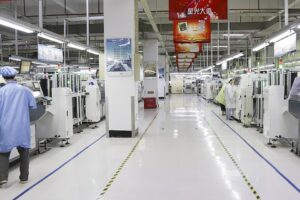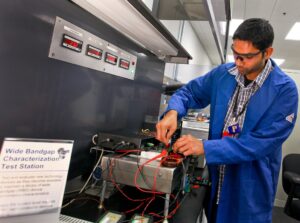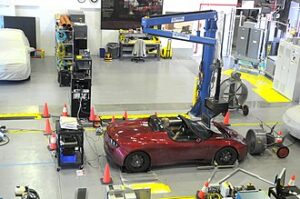Technology Competitiveness Policy Studies
TCIP Center has commissioned experts and researchers in technology, business, and public policy to produce cogent and timely policy reports.
These reports aim to provide trusted independent scholarly advice to policy makers and lawmakers regarding technology policy development to ensure leadership in technology, R&D and advanced manufacturing for economic prosperity, national security, and societal well-being.
 Technology Leadership in Rechargeable Electrochemical Batteries
Technology Leadership in Rechargeable Electrochemical Batteries
Exploring industrial policies to achieve leadership in rechargeable battery technology research and development and advanced manufacturing for economic prosperity, national security, and social benefit.
Study Summary: As a deeply research-intensive industry, batteries incorporate technical advances in product and manufacturing process technology alike. Technology leadership must therefore incorporate the ability to both develop next generation battery chemistries and prototypes as well as the ability to ramp the advanced manufacturing methods that enable economically competitive scaling to high volume production. Research and manufacturing are intimately linked in the battery industry. Ultimately, a country that leads in manufacturing will also likely advance the in next generation chemical energy storage breakthroughs due to domestic expertise of industrialized chemistry and materials processing.
Study Lead:
Edlyn Levine, Harvard University and MIT Sloan School of Management
Study Participants:
Yet-Ming Chiang, Massachusetts Institute of Technology
Erica Fuchs, Carnegie Mellon University
Jeremy Michalek, Carnegie Mellon University
Fiona E. Murray, MIT Sloan School of Management
 Semiconductor Manufacturing Ecosystems
Semiconductor Manufacturing Ecosystems
Understanding the role of ecosystems for advanced semiconductor manufacturing in the U.S., including the current state of the ecosystem in Arizona, a study of other U.S. ecosystems, and a comparison with ecosystems in other countries.
Study Summary: It is widely recognized that technology development is the engine for economic growth and that semiconductors, in particular, are foundational to all technology industries — from self-driving cars, new AI models, to GPS satellites – and will fuel technology competitiveness and economic strength. Additionally, semiconductors are critical to the development and operation of national security assets – from weapons systems to cyber-security – that rely on both legacy and leading-edge semiconductors. While there is strong bipartisan consensus in the United States that microelectronics are a critical technology that will underlie technological competitiveness in the coming decades and that US leads the world in many parts of the semiconductor value chain (e.g., chip design, semiconductor equipment, EDA), the US currently lags behind Taiwan and Korea in the production of leading-edge semiconductor technologies. This study aims to understand the role of ecosystems for a thriving advanced technology production industry (manufacturing), focusing on ecosystem for semiconductor manufacturing in the US by studying the current state of ecosystem in Arizona (collecting information on what has been done, what works well, what does not work well, and the reasons why) and more broadly conduct a comparative study with ecosystems outside of the US, such as Japan, Korea, Taiwan, mainland China, and Singapore.
Study Leads:
H.-S. Phillip Wong, Stanford University
Hassan Khan, Consultant
Study Participants:
Christophe Combemale, Carnegie Mellon University
Lee Fleming, University of California, Berkeley
Willy Shih, Harvard Business School
John Zysman, University of California, Berkeley
 Scaling Wide-Bandgap Technologies for Energy, Transportation, and Digital Infrastructure
Scaling Wide-Bandgap Technologies for Energy, Transportation, and Digital Infrastructure
Analyzing causal and policy factors shaping U.S. WBG semiconductor competitiveness, focusing on scaling up essential technologies production to meet rapidly escalating demand in energy, transportation, and digital infrastructure.
Study Summary: This study aims to provide a causal, networked, and policy-relevant analysis of the U.S. wide-bandgap (WBG) semiconductor ecosystem. The research will identify ecosystem bottlenecks and policy levers across the full materials-to-manufacturing-to-infrastructure deployment pathway, with a focus on supporting national competitiveness in transportation, energy, and digital infrastructure sectors. The study will (1) Map critical causal linkages between research innovation, manufacturing scale-up, supply chain vulnerabilities, and infrastructure deployment for SiC and GaN technologies; (2) Assess how industrial policy tools — including workforce development programs, tax incentives, trade policies, and sustainability regulations — can strengthen U.S. leadership in WBG semiconductors; (3) Quantify the sustainability and resilience impacts of manufacturing pathways, including the carbon footprint of SiC and GaN device production; and (4) Generate evidence-based, actionable policy recommendations to inform strategic investment and industrial policy design.
Study Lead:
Saurabh Amin, Massachusetts Institute of Technology
Study Participants:
Karl Berggren, Massachusetts Institute of Technology
Duane Boning, Massachusetts Institute of Technology
Asu Ozdaglar, Massachusetts Institute of Technology
Tomas Palacios, Massachusetts Institute of Technology
Rajeev Ram, Massachusetts Institute of Technology
 Global Shift Toward EVs and Challenges to American Competitiveness
Global Shift Toward EVs and Challenges to American Competitiveness
Examining the global shift toward electric vehicles, the resulting challenge to American competitiveness in this sector, and what it would take to develop a vibrant American EV industry.
Study Summary: The auto industry has historically served as the bedrock of American manufacturing, as a driver of innovation, good jobs, and a multi-tier supply chain that benefits a wide variety of industries. It has also long been a driver of innovation, including the first adoption of moving assembly lines; robotics; computer-aided design, machining, and manufacturing; and mass-produced electronics. Electric vehicles could play a similar role in advancing widespread adoption of today’s breakthrough technologies, such as advanced batteries, semiconductors, and artificial intelligence for manufacturing, navigation, and control. This study will address the global shift toward electric vehicles and the resulting challenge to American competitiveness in this sector. The research will examine what it would take to develop a vibrant American EV industry by (1) investigating both supply- and demand-side factors; (2) analyzing the current supplier base, investigating both its capabilities in traditional but still foundational technologies such as machining, welding, and tooling and the potential for upgrading with sensors, AI and other smart manufacturing techniques; and (3) investigating the potential for development of new capabilities in areas such batteries, semiconductors, and software.
Study Lead:
John Zysman, University of California, Berkeley
Study Participants:
Anna Duffy, Molecule Ventures and Groundwork Collective
Susan Helper, Case Western Reserve University
Laura Tyson, University of California, Berkeley
 Governing the Future of Nuclear Fusion
Governing the Future of Nuclear Fusion
Building supportive pipelines and frameworks to transition landmark breakthroughs and rapid innovation in fusion energy to commercial viability.
Study Summary: As fusion technology moves from laboratory demonstration to prototyping and deployment, the policy community faces an inflection point. The most likely fuel candidate for fusion is deuterium-tritium (DT), although other fuel choices may be possible. Policymakers must now grapple with how to support innovation responsibly, update regulatory and nonproliferation frameworks, ensure robust international collaboration, and anticipate long-term implications for global energy markets and security dynamics. Unlike fission, fusion does not inherently carry the same proliferation risks, but it intersects with dual-use technologies, requires large-scale tritium handling, and could generate geopolitical realignments if widely deployed. This study aims to provide a strategic policy roadmap for engaging with fusion across the entire innovation-to-deployment lifecycle.
Study Leads:
Andrew Reddie, University of California, Berkeley
Ellie Tubman, University of California, Berkeley
Dan Brunner, FutureTech Partners
Study Participants:
Bethany Goldblum, University of California, Berkeley
Jake Hecla, Massachusetts Institute of Technology
Lee Bernstein, University of California, Berkeley
Anne Marie Ritsaar, Lawrence Livermore National Laboratory
Clement Goyon, Lawrence Livermore National Laboratory
TD MacDonald, Lawrence Berkeley National Laboratory
Scott Hsu, Lowercarbon Capital
 Strategic Pathways for Next-Generation Nuclear Deployment
Strategic Pathways for Next-Generation Nuclear Deployment
Exploring key barriers and opportunities around the development and deployment of next-gen nuclear energy, including small modular reactors and advanced reactors, to deliver safe, scalable, low-carbon energy.
Study Summary: This study explores the key barriers and opportunities associated with the development and deployment of next-generation nuclear energy: Technical, Regulatory, and Government. On the technical front, sustained investment in R&D is essential to overcome outstanding challenges related to reactor design, fuel cycles, cost reduction, supply chain development, and integration with other energy systems. Regulatory frameworks must also evolve to ensure that safety, security, and environmental protection standards are upheld without unduly stifling innovation. Finally, the role of government engagement at the state, local, and federal levels is critical to establish consistent regulatory policy, support demonstration projects, fund foundational R&D via institutions, including the national laboratories, and facilitate public-private partnerships. This study is designed to provide a roadmap for overcoming these challenges, identifying policy, technical, and governance strategies needed to ensure that next-generation nuclear technologies can meaningfully contribute to a resilient, affordable, and sustainable energy future.
Study Leads:
Per Peterson, University of California, Berkeley
Andrew Reddie, University of California, Berkeley
Study Participants:
Peter Hastings, The Hastings Group
Jake Hecla, Massachusetts Institute of Technology
Laura Holgate, Nuclear Threat Initiative
Janet Napolitano, University of California, Berkeley
Jesse Sloane, Deep Isolation
Chris Stanek, Los Alamos National Laboratory
Pranay Vaddi, Massachusetts Institute of Technology
